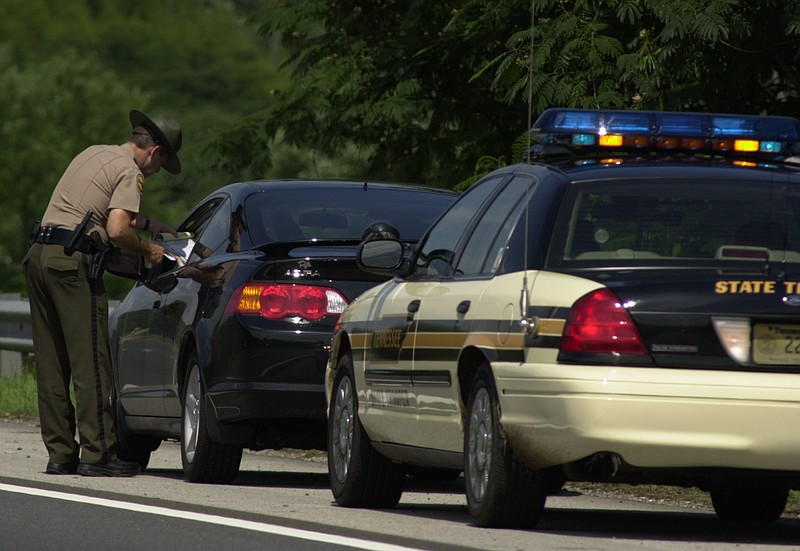NASHVILLE - OK, you're cruising east along the three-lane section of Interstate 24 toward Chattanooga's Missionary Ridge cut when you switch over to the left lane to bypass slowing traffic caused by a heavy truck laboring up the grade.
But you find yourself slamming on the brakes when you realize you're now stuck behind an equally slow car clogging up the passing lane.
State Rep. Dan Howell, R-Georgetown, shares your frustration. And on Monday, he's counting on at least 49 House colleagues to join him in voting "yes" on his proposed "Slowpoke Law."
Howell said he wants to promote safety and reduce "congestion, driver frustration and road rage" by updating state traffic law. His bill says motorists may not drive in the passing lane on interstates or divided highways with at least three lanes except to pass.
Howell said the idea is that motorists in a passing lane cannot impede the flow of traffic. They must move to the right if possible, even if they're going the speed limit and the vehicles behind them are speeding.
"If you're in the left lane of a three-lane highway and you're not there to pass and if you're impeding the flow of traffic, an officer has the option of writing you a ticket," Howell said. "This bill does not address speed limits. It addresses the normal flow."
He said similar laws are on the books in 29 states and the goal is to promote safety.
"It's not the speed on the highway that kills as much the weaving in and out of traffic which is caused by people who impede the flow of traffic," Howell said.
The slowpoke law would not apply when traffic volume doesn't permit a driver to safely merge right or when nasty weather or traffic control devices make it necessary to stay in the passing lane. The same goes for avoiding traffic moving onto the highway from an acceleration or merging lane.
The General Assembly is filled with lawmakers who cope with Tennessee roads and drivers during their weekly commutes to and from the state Capitol in Nashville.
Howell's bill whizzed through House subcommittees and full committees.
"I'll have to say I've had tremendous interest from my colleagues," he said. "Everyone who stops me in the hall and talks to me says, 'I love that bill.' And that's on both sides of the aisle."
"Officially, we have deferred on the bill," Col. Tracy Trott of the Tennessee Highway Patrol told House Transportation Subcommittee members last month. "We really don't have any concerns about it. We see that congestion is a problem on our interstates. More people are choosing to drive in the left lane without passing vehicles."
Trott said he experiences that in his travels, too.
"In a trip, say, from Nashville to Johnson City, I tend to have to pass more cars on the right side than I do on the left side," Trott told lawmakers.
However, he told lawmakers, "I think there's going to be difficulty in enforcing it."
"I'm not blind to the fact that there's going to be some discretion here involved, that officers are going to have some decisions about who's actually holding up traffic or who's been forced in the left lane or behind traffic."
Asked how well Georgia's 2014 slowpoke law is working, a Department of Public Safety spokeswoman said Friday the agency didn't have the number of citations at hand.
But Atlanta television station WSB-TV reported last May that during the first nine months, the Georgia State Patrol wrote 269 citations, mostly in the Atlanta metro area. Gwinnett County officers wrote more than 100 slowpoke tickets and Cobb County law enforcement cited 200 drivers.
Howell's proposal would not apply to interstates or divided highways with two lanes in either direction. But if the bill works with three lanes, he may come back in the future and try to extend it to interstates and divided highways.
Howell said that 330 round-trip from Bradley County to the Capitol and back, as well as a conversation with a constituent, set him to thinking and researching the issue. He cited statistics saying weaving drivers increase accident rates by as much as 8 percent.
Rep. Karen Camper, D-Memphis, seemed doubtful about drivers in the passing lane move over for speeding drivers. Howell said it's understood the THP generally allows drivers leeway of five miles or so on the posted 70 mph limit.
Camper's questions had Rep. David Alexander, R-Winchester, who supports the bill, joking that "it seems like Rep. Camper may be one of those slowpokes that we're talking about."
Contact staff writer Andy Sher at asher@timesfreepress.com, 615-255-0550 or follow via twitter at AndySher1.

